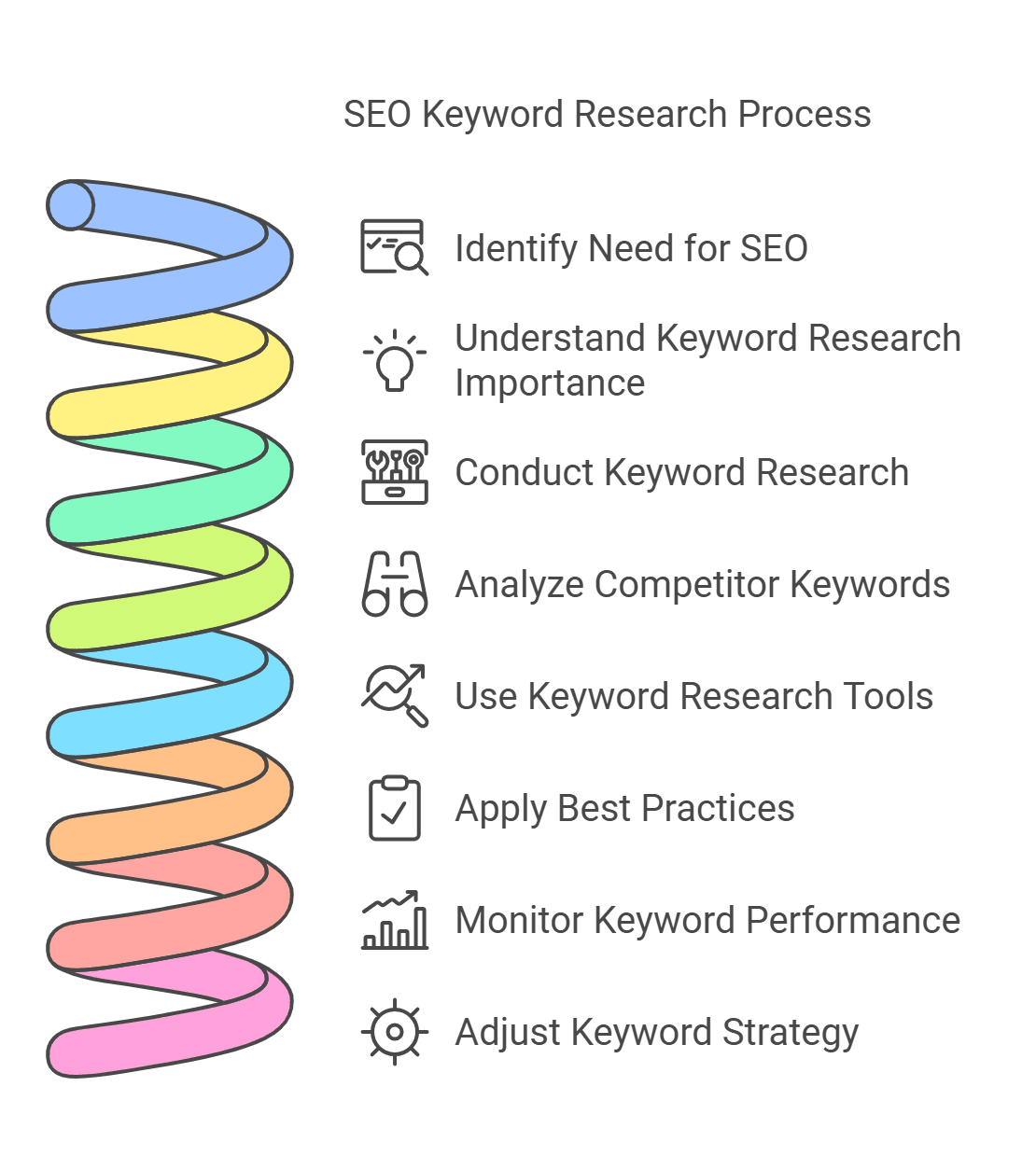Starting a blog is easier than ever in 2025! In this guide, learn how to pick your niche, choose a platform, write your first post, and optimize it for SEO. With these 5 simple steps, you can create your own blog, share your passion, and even start making money online. Whether you're new to blogging or looking to improve your skills, this guide has everything you need to get started!
How to Use Keyword Research to Get Good SEO Results
How to Use Keyword Research to Get Good SEO Results
How To Get Started With SEO
How To Get Started With SEO
These days, it's important for both people and companies to have a strong online presence. One of the most important parts of this appearance is keyword research. But what does it mean to research keywords? Either way, the goal is to learn what words and phrases people use to search for things online. These terms will help you write content that both people will enjoy reading and search engines will like.
A lot of website owners have trouble getting people to visit because they don't know how to use keywords correctly.
This is because your content might not reach the people who need it most if you don't do keyword study. This can be frustrating when you see your competitors do well while no one notices your website.
This article will guide you through the basics of SEO and keyword research, explaining its importance, how to conduct it, best practices, and how to monitor your keywords effectively. By the end, you’ll have the tools you need to enhance your website’s visibility and attract organic traffic.

Why Keyword Research is Important
Why Keyword Research is Important
Helps understand what your target audience is looking for.
Helps understand what your target audience is looking for.
Keyword research provides insights into what potential clients are looking for. Understanding their questions allows you to modify your material to match their wants.
Improves search engine ranking.
Improves search engine ranking.
Including relevant SEO keywords in your text will help you rank better in search engine results pages (SERPS). When your content is relevant to what users are looking for, search engines like Google are more likely to feature it prominently.
generates targeted visitors to your website.
generates targeted visitors to your website.
When you optimize your content with relevant keywords, you attract visitors who are really interested in what you have to offer. This concentrated traffic is more likely to convert into customers or followers.
How to Conduct Keyword Research
How to Conduct Keyword Research
Use Keyword Research Tools.
Use Keyword Research Tools.
To begin your keyword research, use tools like Google Keyword Planner, SEMrush, and Ahrefs. These tools provide useful information on search volume, keyword difficulty, and similar phrases.
Analyze competitor keywords.
Analyze competitor keywords.
Consider the terms that your competitors are targeting. This may help you produce new keyword suggestions and determine which ones are driving traffic to their websites.
Consider using long-tail keywords and understanding user intent.
Consider using long-tail keywords and understanding user intent.
Long-tail keywords are longer phrases that are more specific and usually less competitive. They often target customers that are further along in the purchasing process. When selecting keywords, consider the user's intent—the reason for the search query.
Best Practices in Keyword Research
Best Practices in Keyword Research
Focus on Relevancy and Search Volume.
Focus on Relevancy and Search Volume.
Choose keywords that are related to your content and have a high search volume. This balance ensures that you're targeting terms that people are actively looking for.
Target a blend of high, medium, and low competition keywords.
Target a blend of high, medium, and low competition keywords.
Incorporating a number of keyword difficulty allows you to compete in a variety of categories. High-competition keywords may be more difficult to rank for, but when successful, they can generate a lot of traffic.
Incorporate Keywords Naturally into Website Content.
Incorporate Keywords Naturally into Website Content.
Avoid keyword cramming, as it might affect readability and SEO performance. Instead, use keywords naturally in your headings, subheadings, and body text.
Monitoring and Adjusting Keywords
Monitoring and Adjusting Keywords
Monitor Keyword Performance with Analytics Tools
Monitor Keyword Performance with Analytics Tools
Using analytics tools such as Google Analytics to track how well your keywords are doing. Consider measures such as organic traffic and bounce rates.
Regularly update and refine your keyword strategy.
Regularly update and refine your keyword strategy.
SEO is not a one-time activity; it requires regular updates. Reevaluate your keyword approach on a regular basis, taking into account performance statistics and changes in user behavior.
Stay Aware of Changes in Search Engine Algorithms
Stay Aware of Changes in Search Engine Algorithms
Search engines regularly improve their algorithms. Staying informed about these changes allows you to adjust your plan properly.
For more insights on Understanding the Fundamentals of SEO, check out our blog post.
Conclusion
Conclusion
In conclusion, keyword research is an essential element of any successful SEO strategy. It enhances your search engine rankings, generates targeted traffic to your website, and assists you in comprehending the search terms that users are using. By implementing the strategies outlined in this article, you will be more prepared to optimize your content for success.
Commence employing keyword investigation immediately! Investigate resources such as SEMrush or Google Keyword Planner to acquire valuable insights regarding your audience's search habits.
To acquire additional knowledge regarding keyword research and SEO strategies, it is advisable to consult reputable blogs or online courses that specialize in digital marketing.
FAQ's
FAQ's
What is keyword research?
Keyword research is the process of determining common terms and phrases that people use in search engines.
Why is keyword research crucial in SEO?
It improves search engine rankings by ensuring that information is relevant to what consumers are searching for.
What are long-tail keywords?
Long-tail keywords are longer, more specific phrases with less competition than those that are shorter.
What tools can I use for keyword research?
Popular tools include Google Keyword Planner, SEMrush, and Ahrefs.
How frequently should I change my keyword strategy?
Review and modify your strategy on a regular basis, taking into account performance indicators as well as modifications in user behavior or search engine algorithms.
Want to Make More Money?
Want to Make More Money?
Learn How To Launch Your Own Wildly Profitable Affiliate Marketing Business In Just 7 Days.
Learn How To Launch Your Own Wildly Profitable Affiliate Marketing Business In Just 7 Days.
Similar Posts
Similar Posts

Top 5 Free and Paid Tools Every Content Creator Needs in 2025
Discover the top 5 tools every content creator needs in 2025 to streamline content creation, save time, and boost revenue. These tools cover video editing, graphic design, planning, SEO, and lighting — everything you need to level up your content and start earning.
Want to Make More Money?
Want to Make More Money?
Learn How To Launch Your Own Wildly Affiliate Marketing Business In Just 7 Days.
Learn How To Launch Your Own Wildly Affiliate Marketing Business In Just 7 Days.
